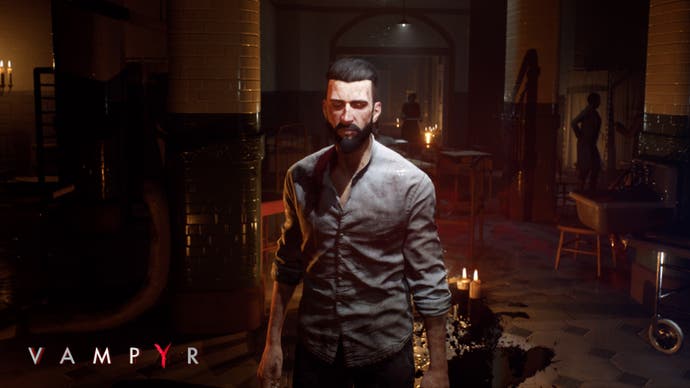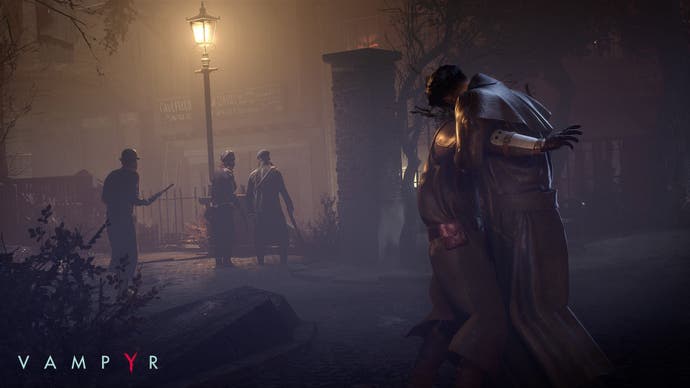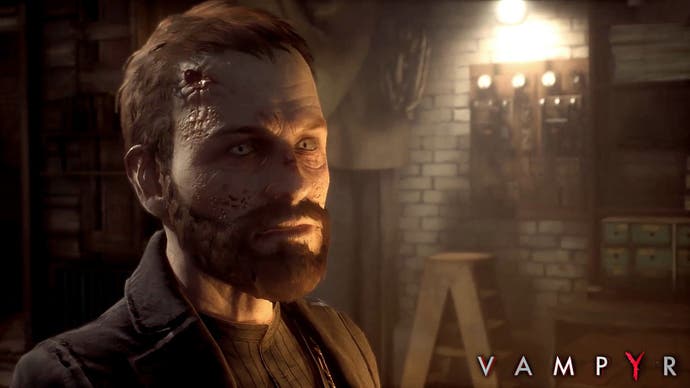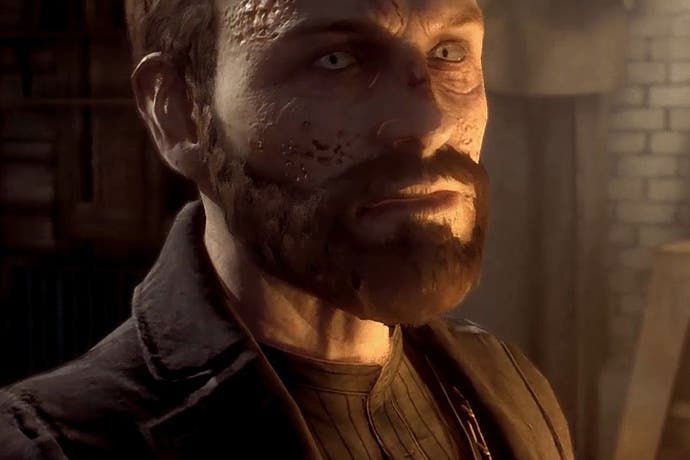Vampyr's parasitic promise is plagued by conflict
Ludonarrative dissofangs.
Disease has always been joined at the hip to superstition and fantasy - the term "influenza" once referred to the influence of unfriendly stars - but there's something especially, horribly otherworldly about the flu epidemic of 1918-1920, which claimed over 50 million lives. Invisible to the microscopes of the era, the Spanish flu was a phantom terror, its spread censored to shore up morale in the closing stages of the Great War. Where other outbreaks had ravaged children and the elderly, this one bizarrely reserved its worst excesses for hearty young adults: its effects included "cytokine storms" that turned stronger immune systems against themselves, drowning the afflicted in their own bodily fluids. With no cure forthcoming, many sufferers fell back on folk remedies and occult treatments, lining their nostrils with salt, tying ribbons to their arms and burning brown sugar or sulfur to chase away evil miasmas. It's from this tangle of science and myth, monsters of the imagination versus the monsters of the laboratory, that Dontnod's long-in-development Vampyr takes its cue.
Vampyr is an odd beast, the kind of cheesy yet high-concept fare Dontnod seems to specialise in, but its appeal and potential shortcomings are easy to summarise: it's one kind of game eating another kind of game alive, a third-person RPG-brawler with its fangs sunk into the neck of an open-ended, dialogue-driven adventure game. Brooding, hirsute protagonist Jonathan Reid is boss doctor at a London hospital in 1918, charged with the well-being of 60 fully fleshed-out civilian characters, from flu patients and recovering soldiers to the crooks, shopkeepers, scholars and charlatans in the pubs and alleyways beyond. He's also, however, a closet vampire who spends his leisure hours duffing up would-be Van Helsings and other, less sociable varieties of undead, and he needs plenty of blood to unlock and improve his abilities.

You'll steal a few mouthfuls of gore from opponents in combat, all of whom appear to be generic characters that can be slain with impunity, but the most bountiful sources are the civilians in your care. It creates a rather dramatic conflict of interest - and a potent balance of player priorities, with the consequences writ large both in the number of plot threads available and the ambience of this region-based open world. Are you just another mindless plague in a plagued city, reducing hard-up districts to flame-licked wastelands devoid of friendly presences, tearing the very narrative fabric of the game apart as you thin out London's ailing society? Or will you try to discriminate between the deserving and undeserving, or even do without those precious level-ups entirely?
A bit of strategy is necessary in either case, because Reid can't just barge in everywhere like a disagreeable toddler, biting and kicking - he needs to maintain his cover as a doctor. He also, ideally, needs to ensure that his victims are in peak condition, and it's here that the game's exploration of vampirism as an allegory for real-life disease gets very intriguing. Healthier people yield a more bountiful harvest, so even if you're minded to chug down the entire cast, you'll still want to play the healer, crafting remedies at Reid's various unlockable hideaways for ailments like colds. This echoes the way the most pernicious and enduring real-life virus strains are, in fact, the least aggressive. Viruses can't prosper, after all, if they kill off every host before that host has a chance to infect others.
Keeping your prey in the pink aside, you'll also be able to drink deeper for bonus XP if you know each character well. This entails a bit of detective work, like tracking down a journalist who's written about the object of your appetites, or sifting rooms for documents. In the process, you'll fetch up against a few of vampirism's celebrated disadvantages. Reid can't enter a dwelling without permission, for example, so you'll need to either persuade the occupant to let you in or use your supernatural charm to overcome their doubts.
Each character has a numerical mental resilience: lower it enough by uncovering "hints" about the other person, and Reid can force them to reveal things or do his bidding, ultimately leading the poor soul off to a quiet corner where he can gorge unnoticed. Traits and relationships between characters can be studied in menus, and a crimson X-ray vision mode lets you appraise passers-by much as Ubisoft's Watch Dogs let you scan their phone histories. Strolling through a smoggy and downtrodden Whitechapel, eyeing up the circulatory systems and secrets of unsuspecting pedestrians, I felt very much the parasite, probing the city's moribund flesh for weaknesses.
It's a fascinating setup in a medium that is sadly anaemic when it comes to vampire stories. Where it might fall over is in the actual writing and more seriously, the combat. Vampyr's opener is a bit of a dog's dinner: Reid wakes up on a pile of corpses, realises that he is undead and promptly gets into a murderous brawl (read: series of tutorials) with a bunch of rag-tag vampire hunters, all while bellowing things like "this horror - it's a nightmare!" and "you leave me no choice!" There's a capital-T Tragic Event that makes zero impression because you obviously have no history with the people concerned, and a lot of winceworthy, theatrical asides such as "what is darkness but setting sun?"

Thankfully, an episode I was shown from much later suggests that the script does find its feet. At this stage, Reid had become a personable blend of steely compassion and quiet menace, and there are some powerful sequences and decisions in store - trying to revive a rapidly fading patient, for example, while a nurse you're investigating for criminal behaviour alternately helps out and questions your decisions. The broad thrust of the plot sees Reid tracking down the vampire who turned him, and I'm hoping it will really dig into the tension between his hard-nosed professional rationalism and the supernatural events that ensue.
I'm much less hopeful about the fighting, which is a bit of a dirty great hammer to the rest of the game's gleaming scalpel. You've got three-hit combos, a choice of double-handed weapons or a knife and pistol, dodge rolls, parries and a parade of slightly flaccid special moves. The latter draw upon a blood gauge (not to be confused with blood-as-XP) that is replenished by nibbling on opponents after softening them up with an elbow-stun. Reid can sculpt the red stuff into spears and mist bombs, turn invisible, maul people with vaporous talons, pounce on them from afar and coagulate the blood in their veins to sabotage their defences. Human opponents will retaliate with fire and blade, other vampires with tooth and claw; both categories of foe are split straightforwardly between grunts, ranged threats and lumbering meatshields who must be whittled down.

It's serviceable enough as third-person fisticuffs go, and there's longevity in the form of ability mods that let you, for example, toss three blood-spears in one or absorb enemy health using those mist bombs. But all of it feels on loan from a less ambitious game, which makes the thought of a parasitic/symbiotic relationship with Vampyr's narrative sandbox as troubling as it is enticing. It's not like you can avoid the fighting, as some encounters are woven into the story; indeed, those difficult decisions about whether to feed and level up rely on you occasionally being thrust into battle. The idea of narratives and systems that prey upon one another is delightfully vicious, but it also speaks to the gulf between the Dontnod of a few years ago, known for the smart but unremarkable action epic Remember Me, and the Dontnod propelled to fame by the Life Is Strange adventure series. It's as though the studio's past were trying to take a sneaky bite out of its present.
The 1918 flu strain vanished of its own accord, but it has been recovered and synthesised from corpse tissue preserved by Alaskan permafrost. The virus is currently being kept in a research facility in Atlanta, a prospect best not pondered late at night. Influenza at large, of course, is an on-going problem, and for all the march of science many superstitions about it persist. Last month I was laid up with the flu and found myself maniacally repeating the old mantra "feed a cold and starve a fever". On Googling this today I find out that it is largely make-believe, if not quite as silly as shoving salt up your nose. There's certainly a place, then, for a game like Vampyr, which sheds light on the mythologisation of disease while entwining genres to brilliantly virulent effect. So far, though, it's not quite as infectious as I'd like it to be.









